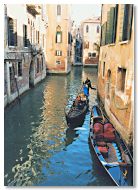 The best time weather-wise to travel to Europe depends on what you like to do and where you are going.
The best time weather-wise to travel to Europe depends on what you like to do and where you are going.
Summers are hot, which is why most Europeans head for the beaches. Fall is generally rainier than in spring and winter is, well… wintery.
Europe can be quite stormy in winter, but weather in northern Germany is going to be a lot colder than that in southern Italy or Greece. If you are a skier, cold weather is exactly what you want! And winter-time trips to experience the Christmas Markets are generally a bargain and January sales in Paris are fabulous. Obviously, there are fewer tourists in winter and when school is in session than the rest of the year. Be sure that there are no major shows taking place when you want to go, or hotels will be at high rates and perhaps even sold out. Your Travel agent can give you that information, as the dates change every year.
 The most active time for tourism is in summer. Just like in the US, most festivals, parties and parades take place during that time. But keep in mind, crowded cities such as Rome and Florence (and anything south of them) are brutally hot in summer. But, if you are minding your budget, hotels have bargain prices in the larger cities in July and August because business people are vacationing at the resort towns along the sea, where prices are at their highest.
The most active time for tourism is in summer. Just like in the US, most festivals, parties and parades take place during that time. But keep in mind, crowded cities such as Rome and Florence (and anything south of them) are brutally hot in summer. But, if you are minding your budget, hotels have bargain prices in the larger cities in July and August because business people are vacationing at the resort towns along the sea, where prices are at their highest.
Spring seems to be less rainy than fall in Western Europe and the British Isles. So, I love traveling to England, Ireland and Scotland in Spring.
As for me, I travel in Spring (April – May) or Fall (September – October). Airline tickets are a little less expensive than in the summer, the weather is usually fantastic…and the hoards have not yet descended or have gone home.
Whenever you go, you can have a fantastic time. Just plan ahead for the weather.


Comments